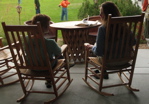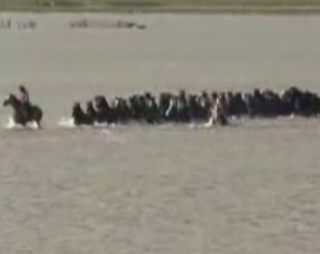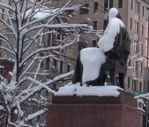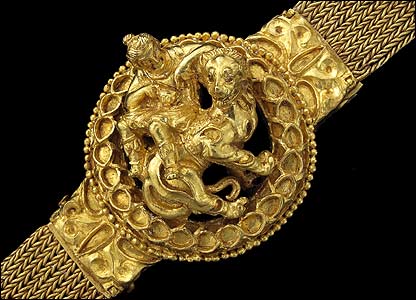 "Protecting marine areas for even relatively brief periods can significantly restore depleted fish stocks, scientists said on Monday. Researchers found that after an area off the coast was closed to fishermen for seven months, the number of octopus caught later rose 13 times. This study shows marine protected areas not only serve as a powerful conservation tool helping species thrive, but can also be a powerful economic tool helping fisheries remain productive and profitable." (Reuters via ENN)
"Protecting marine areas for even relatively brief periods can significantly restore depleted fish stocks, scientists said on Monday. Researchers found that after an area off the coast was closed to fishermen for seven months, the number of octopus caught later rose 13 times. This study shows marine protected areas not only serve as a powerful conservation tool helping species thrive, but can also be a powerful economic tool helping fisheries remain productive and profitable." (Reuters via ENN)
Octopus Study Shows Efforts to Save Fish Stocks Pay Off
Moderates Deliver Blow to Iran’s Hardline President in Elections
Friday’s elections in Iran, billed by many as the first electoral test for the new hard line president, are looking like a "major defeat" for Ahmadinejad, who has isolated his country with anti-western rhetoric (like his statement that Israel should be "wiped off the map").
"Initial results of elections throughout the country indicate a decisive defeat nationwide," said the pro-reform Islamic Iran Participation Front, "tantamount to a big ‘no’ to the government’s authoritarian and inefficient methods." (Guardian)
‘Pursuit of Happyness’ Tops Box Office
 A new movie, The Pursuit of Happyness, features an uplifting story of a homeless man (Will Smith) who is inspired to succeed for his young son. Despite a series of setbacks he perseveres and overcomes. That’s just what the movie did at the box office in its first weekend: Moviegoers boosted the film past Eragon into the number one slot with gross receipts of 26.5 million dollars. Get inspired this holiday season with Will Smith: "You want something? Go get it. Period."
A new movie, The Pursuit of Happyness, features an uplifting story of a homeless man (Will Smith) who is inspired to succeed for his young son. Despite a series of setbacks he perseveres and overcomes. That’s just what the movie did at the box office in its first weekend: Moviegoers boosted the film past Eragon into the number one slot with gross receipts of 26.5 million dollars. Get inspired this holiday season with Will Smith: "You want something? Go get it. Period."
GNN Site is Improving
Editor’s Announcement
 The search engine over on the right column of our site is now back in service. Something was causing nasty 404 error pages to be shown to our readers whenever they searched on the site. But it’s fixed! Yay. In December I decided to hire a Web site maintainence person to take care of the many problems and upgrades that needed tending. Help GNN with the cost of maintaining the site — filled with good news and inspiration — by claiming a link and helping us to grow our list of 500 Good Things!
The search engine over on the right column of our site is now back in service. Something was causing nasty 404 error pages to be shown to our readers whenever they searched on the site. But it’s fixed! Yay. In December I decided to hire a Web site maintainence person to take care of the many problems and upgrades that needed tending. Help GNN with the cost of maintaining the site — filled with good news and inspiration — by claiming a link and helping us to grow our list of 500 Good Things!
Energy Neighbor Fund Shares the Gift of Warmth
 Faced with high fuel costs, more families than usual are expected to need help staying warm during the holidays and throughout the winter. Progress Energy and its customers and employees in North Carolina are giving the gift of warmth with the Energy Neighbor Fund…
Faced with high fuel costs, more families than usual are expected to need help staying warm during the holidays and throughout the winter. Progress Energy and its customers and employees in North Carolina are giving the gift of warmth with the Energy Neighbor Fund…
United Arab Emirates Voters Cast Ballots in Historic First Polls
 Taking one baby step on the path to general election polling for all, the United Arab Emirates, a Persian Gulf state that was created in 1971, held its first election Saturday. Hand-picked voters cast their ballots to elect members of an federal advisory assembly. First round winners in the historic election included a lone woman who secured five votes. (The BBC explains the election process, while a Euphoric Perspective is provided by UAE’s own Khaleej Times)
Taking one baby step on the path to general election polling for all, the United Arab Emirates, a Persian Gulf state that was created in 1971, held its first election Saturday. Hand-picked voters cast their ballots to elect members of an federal advisory assembly. First round winners in the historic election included a lone woman who secured five votes. (The BBC explains the election process, while a Euphoric Perspective is provided by UAE’s own Khaleej Times)
Man’s Best Find! Katrina Victim, Dog Reunited
When Hurricane Katrina swept through the Gulf Coast last year, Steven Cure lost his house, his possessions, but worst of all, his best friend. Rocky was adopted as a puppy back in 1999 and the closest thing to a child in Steven’s life. "I knew he was alive, I never gave up." said Cure, 51 — who had to move from New Orleans. Then, a few weeks ago, Cure received a phone call that almost knocked him off his feet… (photo and reunion story at New York Daily News)
Sharp Decline in US Breast Cancer Cases
 A new analysis of breast cancer rates in American women released this week revealed a startling decline in the disease. Researchers believe that millions of older women refraining from taking hormone pills led to 14,000 fewer cases of tumors in 2003…
A new analysis of breast cancer rates in American women released this week revealed a startling decline in the disease. Researchers believe that millions of older women refraining from taking hormone pills led to 14,000 fewer cases of tumors in 2003…
According to a new analysis led by researchers at The University of Texas M. D. Anderson Cancer Center, presented at the 29th annual San Antonio Breast Cancer Symposium, the sharp decline may largely be due to the fact that millions of older women stopped using hormone replacement therapy (HRT) in 2002.
Investigators report that there was an overall 7 percent relative decline in breast cancer incidence between 2002 and 2003, and that the steepest decline — 12 percent — occurred in women between ages 50–69 diagnosed with estrogen receptor positive (ER-positive) breast cancer. This is the kind of breast cancer that is dependent on hormones for tumor growth. “It is the largest single drop in breast cancer incidence within a single year I am aware of,” says Peter Ravdin, M.D., Ph.D., a research professor in the Department of Biostatistics at M. D. Anderson.
“Something went right in 2003, and it seems that it was the decrease in the use of hormone therapy, but from the data we used we can only indirectly infer that is the case,” he says.
“But if it is true, the tumor growth effect of stopping use of HRT is very dramatic over a short period of time, making the difference between whether a tumor is detected on a mammogram in 2003 or not,” says Ravdin.
The study’s senior investigator, Donald Berry, Ph.D., professor and head of the Division of Quantitative Sciences at M. D. Anderson, says he was, at first, very surprised by both the magnitude and the rapidity of the decline in incidence, but adds “it makes perfect sense” if you consider that use of HRT may be an important contributing factor to breast cancer development.
“Incidence of breast cancer had been increasing in the 20 or so years prior to July 2002, and this increase was over and above the known role of screening mammography,” he says. “HRT had been proposed as a possible factor, although the magnitude of any HRT effect was not known. Now the possibility that the effect is much greater than originally thought all along is plausible, and that is a remarkable finding.”
HRT provides both estrogen and sometimes also progestin hormones to women who are postmenopausal. The ongoing Women’s Health Initiative study of 16,608 women 50–79 years old using HRT was prematurely stopped in July 2002 when the combination of estrogen and progestin was found to significantly increase the risk of developing invasive breast cancer.
Ravdin said about 30 percent of women older than 50 had been taking HRT in the early years of this decade, that about half of these women stopped using HRT in late 2002 after the results of the large study were announced. “Research has shown that ER-positive tumors will stop growing if they are deprived of the hormones, so it is possible that a significant decrease in breast cancer can be seen if so many women stopped using HRT,” he says.
“It takes breast cancer a long time to develop, but here we are primarily talking about existing cancers that are fueled by hormones and that slow or stop their growing when a source of fuel is cut,” Berry adds. “These existing cancers are then more likely to make it under mammography’s radar.”
But the researchers stress that because the analysis is based solely on population statistics, they cannot know for certain the reasons why incidence declined. “We have to sound a cautionary note because epidemiology can never prove causation,” he says. They considered whether other effects may be involved (such as decreased use of screening mammography and changes in the use of anti-inflammatory agents, SERMs or statins) but only the potential impact of HRT was strong enough to explain the effect.”
They examined rates of breast cancer from nine regions across the country from 1990 to the end of 2003 and found that while incidence increased at 1.7 percent per year from 1990 to 1998, it began to decrease, relative to other years, 1 percent each year from 1998 to 2002. When that 1 percent increase was adjusted for age in each of those years, incidence from 1998 to 2002 stayed about the same, Ravdin says. “There were more cases of breast cancer being diagnosed, but that was because women were getting older and entering the higher risk pool.”
But by the end of 2003, there was a 7 percent, age-adjusted decrease in the number of breast cancer cases diagnosed. With further analysis, the researchers discovered that decline in incidence was far greater in ER-positive breast cancer (8 percent) compared to ER-negative breast cancer (4 percent). And when they looked at women 50–69 years old, the decline in ER-positive cancer was 12 percent, compared to 4 percent in ER-negative breast cancers. After adjusting for age, the researchers concluded that there was an absolute decline of about 14,000 fewer women diagnosed with breast cancer in 2003 than in 2002. (University of Texas Cancer Center)
Sight Returned After Horse Kick to Head
 During World War II an explosion shot some metal into Don Karkos’s eye. Doctors told him he would never see again with his right eye. When asked if he wanted the eyeball removed he said, "Nah, let’s leave it in for looks." Sixty-two years later, while preparing a racehorse for riding, he got whacked flush in the head, hard and straight above his blind eye. When he got home later his sight had been restored…
During World War II an explosion shot some metal into Don Karkos’s eye. Doctors told him he would never see again with his right eye. When asked if he wanted the eyeball removed he said, "Nah, let’s leave it in for looks." Sixty-two years later, while preparing a racehorse for riding, he got whacked flush in the head, hard and straight above his blind eye. When he got home later his sight had been restored…
Kids Helping Animals for the Holidays
 Elementary School students are filling the stockings of needy puppies and kittens at the Animal Rescue League this month with donations of dog biscuits and chew toys, decorating a "giving tree" at their school with gifts of dog and cat food, leashes and grooming brushes. (Des Moines Register has the story and cute photo)
Elementary School students are filling the stockings of needy puppies and kittens at the Animal Rescue League this month with donations of dog biscuits and chew toys, decorating a "giving tree" at their school with gifts of dog and cat food, leashes and grooming brushes. (Des Moines Register has the story and cute photo)
Homeless Programs Benefit Every Taxpayer
 Giving homeless people stable housing conditions and providing them with comprehensive social services sounds like an expensive proposition, but the Denver Rocky Mountain News believes the $13,800 spent per year per person is money very well spent. In a study released Monday, the costs government would have paid — $43,239 for emergency services over two years if the people remained homeless — leaves taxpayers ahead by $4,745 each…
Giving homeless people stable housing conditions and providing them with comprehensive social services sounds like an expensive proposition, but the Denver Rocky Mountain News believes the $13,800 spent per year per person is money very well spent. In a study released Monday, the costs government would have paid — $43,239 for emergency services over two years if the people remained homeless — leaves taxpayers ahead by $4,745 each…
Quick Thinking Hero Catches Tot From Window
"If I had delayed one more second, she would have fallen to the ground," Jaimen Ortiz said in Spanish, at a ceremony honoring his quick reactions that saved a toddler from certain injury in a Virginia neighborhood. (AP with photo)
Endangered Gorillas Prosper in Heart of Africa
A 2003 census showed Gorillas in Africa have increased their numbers by 17 percent since 1989, not due to a change in the number of births, but because “there’s no more poaching.”
Rescue of 100 Stranded Horses Through Floodwaters (Video)
 A powerful combination of story and music: More than 100 horses were stranded on a small island for days after a heavy storm. 19 of them drowned while onlookers feared for the lives of the rest. A group of women on horseback then attempted a rescue… Very moving!
A powerful combination of story and music: More than 100 horses were stranded on a small island for days after a heavy storm. 19 of them drowned while onlookers feared for the lives of the rest. A group of women on horseback then attempted a rescue… Very moving!
From Mark in the Netherlands comes this video montage and message to audiences viewing on the web: “The source for the video is a Dutch newsgroup: NOS Journal. I didn’t made the images myself, I just combined them! I was suprised myself by the great video and hereby I want to say thanks to the news team!!”
Study: Higher Taxes are Good for a Nation’s Health and Well-Being
 A new study revealed that countries with higher taxes are happier, healthier, benefit from more research and development, and a higher GDP rate per person, meaning they are making more money overall.
A new study revealed that countries with higher taxes are happier, healthier, benefit from more research and development, and a higher GDP rate per person, meaning they are making more money overall.
Mayor in Spain Delivers White Christmas
 Are you dreaming of a White Christmas? One mayor decided to do something about it, even though his is a warm coastal town in Spain. He set up snow cannons to blast the central square with frozen white stuff every evening at 8 o’clock. It’s a big hit with the 20,000 residents of Lepe, as Mayor Gonzalez knew it would be: “We do it mostly for the children — because if the children are happy, so are the parents.” (Herald Tribune)
Are you dreaming of a White Christmas? One mayor decided to do something about it, even though his is a warm coastal town in Spain. He set up snow cannons to blast the central square with frozen white stuff every evening at 8 o’clock. It’s a big hit with the 20,000 residents of Lepe, as Mayor Gonzalez knew it would be: “We do it mostly for the children — because if the children are happy, so are the parents.” (Herald Tribune)
Afghan Treasure Safeguarded for Decades by Secret “Keyholders”
 A 2,000-year-old gold treasure trove of Afghanistan’s heritage was guarded for decades by a mysterious group of Afghans who patiently kept the secret of its underground whereabouts, at great personal risk during the time of upheaval and war with Russia and the Taliban. The group were known as the “key holders,” because they held the keys to the basement vault where the historical treasures were hidden…
A 2,000-year-old gold treasure trove of Afghanistan’s heritage was guarded for decades by a mysterious group of Afghans who patiently kept the secret of its underground whereabouts, at great personal risk during the time of upheaval and war with Russia and the Taliban. The group were known as the “key holders,” because they held the keys to the basement vault where the historical treasures were hidden…
Elk Return to British Columbia
 Elk are alive and well in the Lower Mainland of BC for the first time in a century, following the transplanting of two separate populations two years ago, the BC Ministry of Environment is reporting…
Elk are alive and well in the Lower Mainland of BC for the first time in a century, following the transplanting of two separate populations two years ago, the BC Ministry of Environment is reporting…
Homeless Getting New Lease on Life
"Across Massachusetts, men and women who have spent years on the streets finally have what they’ve always wanted. A house key." The Boston Herald reports on an innovative program that takes the chronically homeless "out of the shelter system by offering permanent housing in a group setting where access to medical, mental health and substance services are never far away." (story submitted by GNN’s Columbine Phoenix)
Live As If You Only Had a Month: Gratitude Part 4
 In our continuing series, GNN-i looks at Gratitude and how it is essential for creating the life you want. Harry Tucker uses the letters in GRATITUDE, as an acronym to help us remember what attitudes are most important. Part 4 reveals the first T in gratitude represents Time. How we choose to invest time and spend it is critical for our success. Time, in Harry’s opinion, is one of the most valuable things that we have, right behind Life itself and unconditional love…
In our continuing series, GNN-i looks at Gratitude and how it is essential for creating the life you want. Harry Tucker uses the letters in GRATITUDE, as an acronym to help us remember what attitudes are most important. Part 4 reveals the first T in gratitude represents Time. How we choose to invest time and spend it is critical for our success. Time, in Harry’s opinion, is one of the most valuable things that we have, right behind Life itself and unconditional love…




















